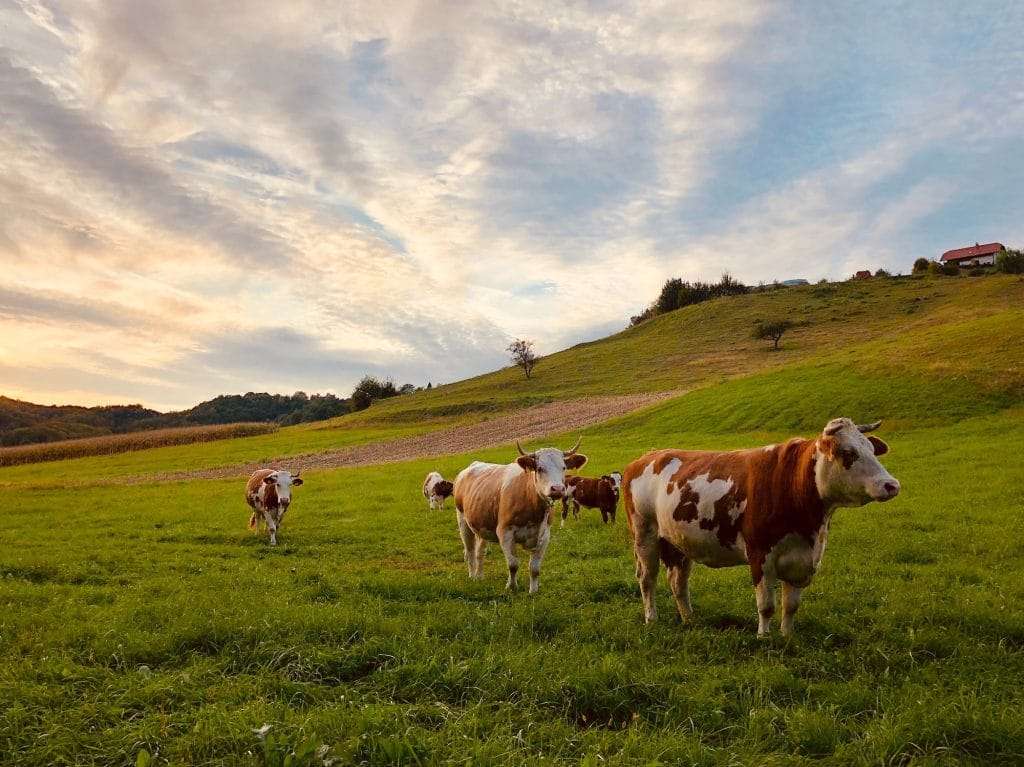Joyful Ventures, an emergent climate-focused venture fund — and the first in the industry to be led by a diverse team of LGBTQ individuals and women — has launched with $23 million to overhaul the food system.
The newly launched Joyful Ventures fund, which closed $23 million of its intended $25 million, is helmed by industry veterans Milo Runkle, Jennifer Stojkovic, and Blaine Vess.
The new fund aims to redirect the $1.5 trillion global animal protein industry toward the influx of more sustainable and regenerative food solutions.
Funding and future-proofing
Globally, retail sales of plant-based meat surpassed $6 billion in 2022, according to the think tank The Good Food Institute. But the alternative protein sector encompasses a number of other technologies. One buzzed-about tech is cellular agriculture — the science behind the first USDA-approved cultivated meat greenlit last week. It granted approval to two California-based brands, Upside Foods and Good Meat.
The alternative protein sector also includes tech like precision fermentation and molecular farming. There are companies working with novel plant ingredients, fungi, and mycoprotein among others, to replace animal ingredients. And by investing in and fostering these significant advancements in the alternative protein sector, Joyful Ventures says it can bring about potent climate solutions.
Funds like this can’t come soon enough; the most recent IPCC climate report called for urgent action to reduce greenhouse gas emissions.
Last month, a report released by the World Meteorological Organization predicted that the planet will break the 1.5° C Paris Agreement temperature rise threshold for the first time in the near future. The biggest rise in history over pre-industrial temperatures is expected to bring catastrophic natural disasters around the globe.
Already, record-breaking wildfire, drought, and flooding events have become commonplace in recent years. And all signs point to continued extreme weather events and the displacement of millions of at-risk people, many of whom are already struggling in climate-prone regions, as global temperatures heat up.

The acceleration of climate change is tied to a number of key industries, namely energy, transportation, and food. But a recent analysis of climate media coverage found livestock production is often left out of the conversation. According to that study, only seven percent of media content on the climate crisis references livestock farming’s impact despite the industry representing 15 to 20 percent of total global emissions, including methane, which traps considerably more heat than CO2 — more than 25 percent more, according to the EPA.
Livestock production is also driving deforestation; Brazil is now the leading exporter of beef where clearcutting for cattle grazing and feed crops is devastating the Amazon rainforest.
Joyful Ventures
Joyful Ventures says the urgency to act on the climate emergency is an opportunity for innovative startups. It plans to invest in pre-seed and seed-stage startups working to disrupt the food system. This includes companies working with plants and fungi as well as other technologies like precision fermentation, mycoproteins, molecular and cellular agriculture, and all with a marked concentration on B2B opportunities.

The partners bring an extensive range of expertise to the impact investing landscape. Stojkovic, a recognized figure in food-tech innovation as the founder of the Vegan Women Summit and author of The Future of Food is Female, built her career in the tech industry under the mentorship of Silicon Valley’s eminent venture capitalist, Ron Conway. She’s collaborated with industry-leading companies including Google, Microsoft, and Meta. Already a veteran angel investor, Stojkovic partners with and serves as an advisor and board member to the industry’s most significant plant-based brands.
Runkle, founder of the nonprofit Mercy For Animals and co-founder of New Crop Capital and The Good Food Institute, has devoted his career to advocating for food system reform and trailblazing the alternative protein sector. Under Runkle’s leadership, Mercy For Animals raised more than $130 million dollars and formed partnerships with industry titans including Walmart, Nestlé, and McDonald’s to modernize their purchasing and improve the lives of more than two billion animals.
Vess, an experienced entrepreneur and investor, has a history of successful startup exits. This includes his role as founder and CEO of Student Brands, which was acquired by Barnes and Noble Education, and as co-founder of Y Combinator-backed Solve. A Kauffman Fellow, Vess contributes extensive investment experience to Joyful Ventures, having backed more than fifty early-stage companies.
“We’re not just passively investing in promising sustainable food technology startups,” Stojkovic said in a statement. “Our team is fully committed to leveraging our expertise, powerful network, and industry insights to nurture our portfolio companies, guiding them towards growth and success. Not many in the industry have access to the industry’s top founders and CEOs at their fingertips like our team. This kind of connectedness and mentorship experience is invaluable for our founders.”
“We believe that the global movement toward food transformation is expanding and accelerating,” Vess added. “The future is full of multi-billion dollar, world-changing sustainable protein companies whose founders face critical challenges, particularly in the pre-seed and seed stages.”

Runkle says the VC isn’t just investing in companies, but rather, it’s investing in a “global transformation.”
The advisory team and LPs of Joyful Ventures also feature a variety of global industry founders and CEOs, representing diverse voices and perspectives. This includes Bjorn Oste, Co-Founder of the oat milk giant Oatly; Dr. Sandhya Sriram, CEO of Shiok Meats; Ryan Bethencourt, Co-founder of Indie Bio and CEO of Wild Earth; and Arturo Elizondo, CEO of The Every Company.
‘Changing what is on our plates’
Stojkovic told Ethos via email that rather than trying to deal with managing the surplus of carbon, methane, and nitrogen that is being created across the globe, Joyful is focused on preventing those harmful greenhouse gases from being produced in the first place. She says the best way to do this is by “changing what is on our plates.”
She cites data from Boston Consulting Group, which found that investing in plant-based protein is 11 times more impactful from a climate investment perspective than the electric car market. It’s also three times more impactful than decarbonizing cement, and four times more impactful than green buildings. But Stojkovic says that’s where investments touting climate action tend to go. She says for real, scalable, and quick solutions in the fight against climate change “there’s nothing better than food.”
Investing in the picks and shovels of this industry is an inevitable piece of the next wave of investments.
-Jennifer Stojkovic, co-founder, general partner, Joyful Ventures
But there’s still a huge challenge when it comes to educating venture capitalists and investors on the opportunity in changing the food system. “This was by far the most challenging VC environment, certainly of my generation,” says Stojkovic. The partners were fundraising in the shadow of the Silicon Valley Bank collapse. Stojkovic says what helped Joyful stand out to investors though was a “clear competitive advantage” to other funds in the space because of the collective experience and knowledge the partners bring as well as their strong network of founders and CEOs.
Stojkovic says Joyful also stood out to investors because the market is in a down period right now, “which means it’s the best time to invest,” she said. That down period is part of the nonlinear “S curve” adoption rate common in nascent industries.
And while the alternative protein industry is experiencing growing pains during this adjustment period, data continue to show that a wholesale shift away from meat, eggs, and dairy is critical in the climate fight. Consumers are wising up to that, too, with increasing interest in alternatives.
When it comes to climate investing, Stojkovic says there is more to the picture than consumer packaged goods (CPG), though, which the last big wave of investment in the space focused on. Joyful Ventures sees B2B opportunities as “the next big wave” of investment innovation in this space.
Part of the reason for that is that many of the recently launched CPG products are struggling to achieve price parity with their conventional counterparts — and, oftentimes, with their plant-based or sustainable counterparts, too.
Stokjovic says prices on products like the popular meat successors produced by Beyond Meat and Impossible Foods are not going to be able to come down if there’s a lack of investment in the technologies and ingredients that are going to be crucial to scaling those opportunities.
She points to pea protein as a key example. It’s a critical ingredient in the popular Beyond Burgers and sausages. While the protein itself is far more sustainable than conventional beef, the current production landscape sees a significant amount of agricultural waste leftover from the pea crops.

“If we were to create novel new ways to use the waste stream of these products, we could make them more commercially viable products, because we’d be able to bring the cost of the inputs down,” she says. “We firmly believe that investing in the picks and shovels of this industry is an inevitable piece of the next wave of investments. And for this industry to survive, we need to take a systems approach.”
The flip side of that in-the-dirt approach is novel tech such as artificial intelligence and machine learning capabilities, which Joyful Ventures is also focused on. Stojkovic believes these high-tech approaches can revolutionize our understanding of food and change protein consumption habits on a mass scale.
Untapped potential
Nowhere is this tech showing potential than with the more than 20,000 edible plant species that exist. Despite the wide range of crops, only a handful are dominant in the alternative protein sector, currently. Joyful’s team says this catalog of ingredients holds untapped potential that can give rise to new proteins that are not only more sustainable than animal-based ingredients but also tastier and more nutritionally complete.
Stojkovic also says that thinking about resource use, particularly reducing our water footprint in every aspect of the food system, is also crucial to future-proofing. “I believe water is going to be one of the most crucial components to the food system in coming years and decades as it becomes more scarce,” she says. “And so growing crops that can reduce their water intensity is going to be a huge aspect across all government policies (especially here in California).”
But, ultimately, the food solutions themselves are only half of the equation; successfully overhauling the food system really comes down to one thing: understanding and meeting the motivations of the consumer. And that, Stojkovic says, is where Joyful Ventures is unmatched.
“I think one of the challenges that we’ve had in alternative protein in particular, is we kind of lost sight of who is actually buying food,” she says. “The biggest competitive advantage we have is knowing that the vast majority of consumer food purchases are made by women. We have the ability and the unique insights to be able to attract the type of founders and the types of ideas that we know are going to be able to take off in the mainstream.”
Related on Ethos:


